DIAGNOSIS
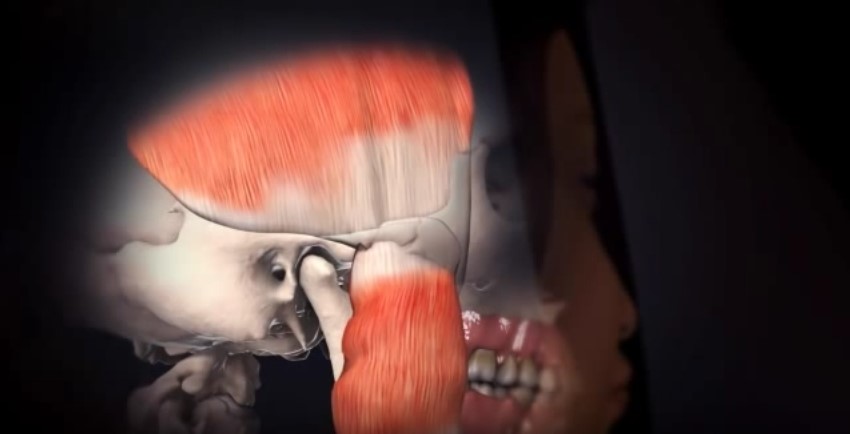
If you experience any of these signs and symptoms, see your dentist. He or she can determine if you are a bruxer and how best to treat it.
Your dentist will ask about your general dental health, what sources of stress you have in your life, and what medicines you take. If you share your bedroom, the dentist also may want to talk to that person. The dentist will ask about your sleep habits, especially about any unusual grinding sounds heard during the night.
Your dentist will examine you, paying special attention to the muscles in and around your jaw. The dentist also will look at your teeth for evidence of grinding. During this examination, your dentist will check for tenderness in your jaw muscles and the jaw joint. He or she also will look for broken teeth, missing teeth and poor tooth alignment.
A more detailed exam may follow if your dentist suspects that your bruxism is related to dental problems. In addition to checking your "bite," (how your upper and lower teeth come together) the dentist will examine your teeth and gums for damage caused by bruxism. Your dentist might also take X-rays of your teeth and jaws.
About 30% of children grind or clench their teeth. The rate is highest in children under age 5. If your child grinds or clenches his or her teeth, discuss the problem with your family dentist. Most children eventually outgrow bruxism and suffer no permanent damage to their teeth.
Expected Duration
Of all children who brux between the ages of 3 and 10, more than half will stop on their own by age 13.
In teenagers and adults, how long bruxism lasts depends on its cause. For example, bruxism can last for many years if it is related to stress that doesn't go away. However, if bruxism is being caused by a dental problem, it should stop when the teeth are repaired and realigned. Often this occurs within a few dental visits.
Prevention
If your bruxism is related to stress, professional counseling may help. You also can try strategies to help you relax. It may help to cut down on stimulants such as tobacco and caffeine.
In both children and adults, tooth damage related to bruxism can be prevented. The usual method is to wear a night bite plate or a bite splint (a dental appliance worn at night to stop teeth grinding). Wearing a bite splint also can help relieve pressure on facial muscles and the jaw joint. Hot compresses on facial muscles may help relieve some of the muscle pain and tightness that bruxism can cause.
Treatment
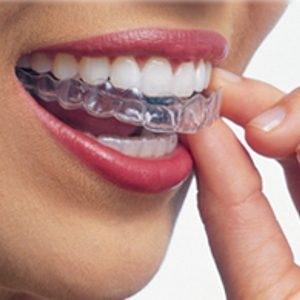
The treatment of bruxism varies depending on its cause:
• Stress : If your bruxism is stress-related, your dentist or physician may recommend professional counseling, psychotherapy, biofeedback exercises or other strategies to help you relax. Your dentist may prescribe a medicine such as diazepam (Valium). This will be for short- term use, usually one week or so. It should be taken at night before you go to bed to help reduce grinding at night. You also may receive a prescription muscle relaxant to temporarily ease the spasm in your jaw. You may also be fitted for a custom-made bite plate. If this does not help, your dentist may refer you to an oral surgeon or to a dentist who has advanced training in head and neck pain.
• Dental problems : If your bruxism is related to tooth problems, your dentist probably will correct tooth alignment. In severe cases, your dentist may need to use onlays or crowns to entirely reshape the biting surfaces of your teeth. The dentist also may make a mouth guard or bite splint that fits your mouth and teeth. This will help prevent further damage to the teeth. In some cases, it may help your teeth and muscles to realign.
• Medicines : If you develop bruxism as a side effect of antidepressant medicines, you have a couple of options. Your doctor may switch you to a different drug or give you another medicine to counteract your bruxism.
When To Call a Professional
Call your physician or dentist if you have symptoms of bruxism, or if you are told that you grind your teeth while you sleep.See your dentist right away if you break a tooth, lose a filling, or notice that your teeth are becoming loose.
Prognosis
Even without special treatment, more than half of young children with bruxism stop grinding their teeth by age 13. Meanwhile, your dentist can fit your child with a night bite plate to prevent excessive tooth wear. This device is effective in almost all children who use it as directed.
In teenagers and adults, the outlook is excellent if bruxism is treated properly and in a timely manner.
Botulinum Toxin Treatment for Bruxism
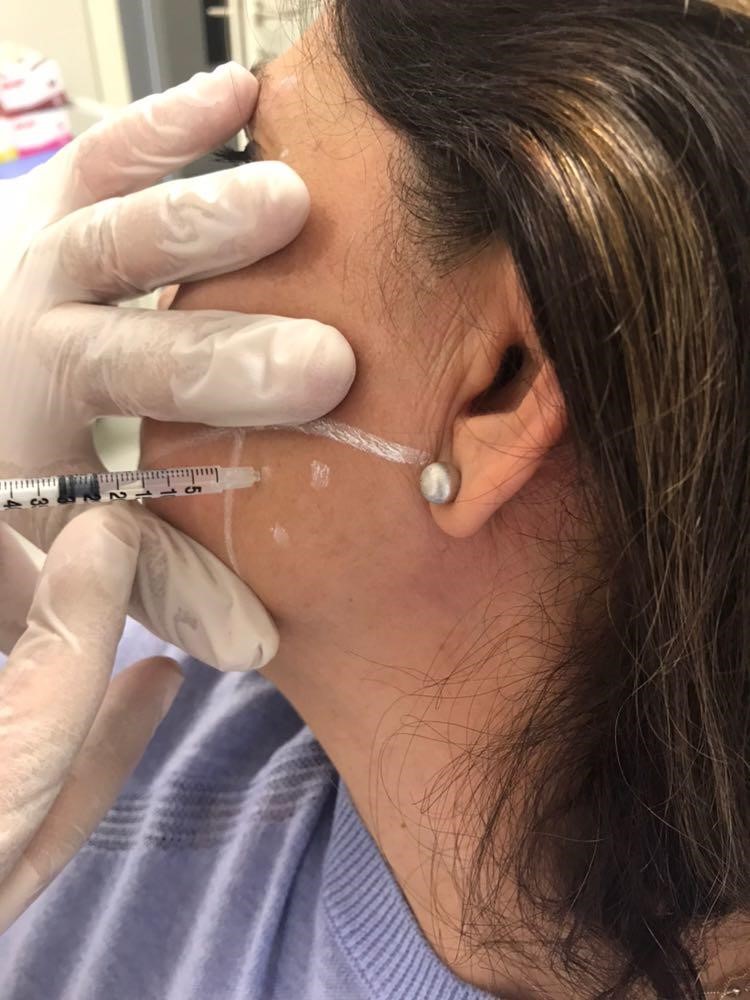
Treatments with Botulinum Toxin Type A., commonly known as botulinum toxin, can provide tremendous relief from jaw soreness, headaches, and other unpleasant problems associated with Bruxism. Botulinum toxin treatments for Bruxism can also soften the appearance of the jaw line.
Botulinum Toxin vs. Conventional Bruxism Treatments
Recently, botulinum toxin has proven to be an ideal treatment option for targeting and treating excessive muscle activity and spasticity. Many other treatments, such as anti-inflammatory medications and dental devices, do not address the source of the problem. Although dental devices can successfully protect teeth from damage at night for bruxism sufferers, they are ineffective in stopping the painful side effects of teeth grinding..
The Procedure
By injecting small doses of botulinum toxin directly into the masseter muscle (the large muscle that moves the jaw), the muscle is weakened enough to stop involuntary grinding of the teeth and clenching of the jaw. This significantly relaxes the muscle and reduces the wear and tear on the teeth due to grinding. Damage to the TMJ (temporomandibular joint) and headaches should be reduced or eliminated as well. Voluntary movements, such as chewing and facial expressions, are not effected at all by botox.
Effectiveness of Botulinum Toxin for Bruxism
Although botulinum toxin injections are not a cure for bruxism, they can effectively control the uncomfortable symptoms better than a nightguard for some patients. Botulinum toxin used for treating bruxism typically lasts for three to four months.
Acupuncture for Bruxism and Teeth Grinding
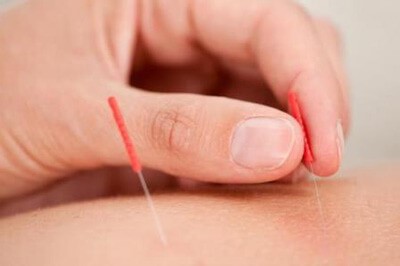
Holistic and alternative treatments such as meditation, aromatherapy, and acupuncture have all become increasingly popular over the last several years. There are myriad reasons for this return to more homeopathic solutions to medical issues, but two of the main causes are the increasing costs of healthcare and the desire for more natural treatment methods.
How Does Acupuncture Work?
For those unfamiliar with acupuncture, this treatment works on several different levels and is effective in treating many different health conditions, both physical and mental. The ancient tradition of acupuncture is based on the belief that the body contains an energy life force called Qi, which flows through our bodies through various channels, known as meridians. When these meridians become blocked, the Qi is unable to travel through the body, resulting in illness. Acupuncture works by placing delicate, sterile needles into certain points in the body to help restore the Qi’s flow and restore equilibrium to the body.
Why Use Acupuncture for Bruxism?
Bruxism and teeth grinding are interesting medical conditions in that they have both mental and physical causes: they are often in part caused by anxiety and stress, in addition to the physical action of clenching one’s jaw and grinding one’s teeth. The result is physical pain in the form of headaches and sore jaw muscles, as well as cracked and damaged teeth in more sever cases of bruxism.
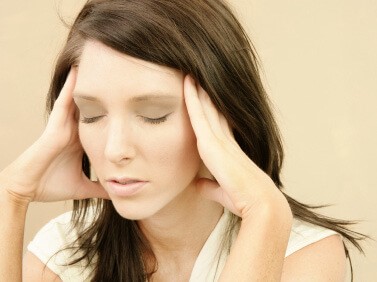
Using acupuncture can help treat both causes – the mental and the physical – by working to relax the mind and body while also treating the pain caused by a bruxism episode. By focusing the mind on relaxation, acupuncture can help relieve stress caused by external and internal issues: while your acupuncturist works, clear your mind of any anxieties and stresses you may be facing, concentrating instead on a peaceful image or memory. If you struggle to clear your mind, try focusing on each sense: breathe in deeply to smell the air around you, focus on your skin to feel the different sensations all around you, and look carefully at the image in front of you to see every inch and detail.
Being relaxed can help the acupuncturist treat the physical issues you may be feeling, making it easier to open up your meridians to get the Qi flowing freely again. In addition to helping with the current physical symptoms such as headaches and jaw pain, the relaxation that comes with acupuncture can help to prevent future bruxism episodes altogether. Practice some of the meditation techniques used during your acupuncture session when you wake up to help alleviate any pain caused by grinding your teeth during the night, and try to relax before bed in order to prevent bruxism before it starts!
Are There Any Side Effects to Acupuncture?
The short answer is “No”! One of the great things about holistic and all-natural treatments such as acupuncture is that they will not put strange or harmful chemicals into your body, many of which can cause us to react negatively, thereby causing side effects. As long as your acupuncturist is using sterile needles, there is no risk of any physical or mental side effects when undergoing acupuncture treatment.
You can also continue with other bruxism treatments while getting acupuncture for bruxism, or any other medical condition, such as wearing a mouth guard at night, taking pain medication, or practicing supplementary meditation techniques. Unlike many medicines, acupuncture won’t interfere with other medicines or cause adverse reactions when combined with other treatments. If you have any concerns at all, however, be sure to talk to your regular healthcare professional and divulge and relevant medical records to your acupuncturist.